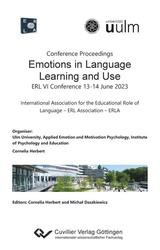| Fachbereiche | |
|---|---|
| Buchreihen (96) |
1381
|
| Nachhaltigkeit |
3
|
| Gesundheitswesen |
1
|
| Geisteswissenschaften |
2370
|
| Medienwissenschaften | 16 |
| Theologie | 57 |
| Philosophie | 102 |
| Rechtswissenschaft | 424 |
| Wirtschaftswissenschaften | 851 |
| Sozialwissenschaften | 418 |
| Sportwissenschaften | 48 |
| Psychologie | 233 |
| Pädagogik | 190 |
| Geschichtswissenschaften | 183 |
| Kunstwissenschaften | 111 |
| Kulturwissenschaften | 166 |
| Literaturwissenschaften | 117 |
| Sprachwissenschaften | 88 |
| Naturwissenschaften |
5408
|
| Ingenieurwissenschaften |
1795
|
| Allgemein |
98
|
|
Leitlinien Unfallchirurgie
5. Auflage bestellen |
|
Erweiterte Suche
Conference Proceedings - Emotions in Language Learning and Use
ERL VI Conference, 13-14 June 2023
Cornelia Herbert (Herausgeber)Michał Daszkiewicz (Herausgeber)
Vorschau
Leseprobe, PDF (110 KB)
Inhaltsverzeichnis, PDF (110 KB)
Emotions are powerful, so is language. Emotions guide perception, attention, memory and decisions making. They challenge or promote health and well-being. Evolutionary, emo-tions have a physical origin and in line with this, a significant pro-portion of emotional signals are communicated non-verbally (e.g., by the face, gestures or voice). Nevertheless, in humans specifically language is taking over a pivotal role in conveying emotions by mentally representing emotions and feelings in terms of abstract concepts, the latter being theoretically assumed to be grounded in perception, action and bodily experiences. Scientifically, an “emotion-without-language” or a “language-without-emotion” perspective has been questioned recently by significant empirical evidence in support of a mutual dependence of emotions and language. However, core questions regarding this functional interdepend-ence remain. Open questions pertain to the role of emotions in language learning and its use, which is the key topic of this year’s ERL conference 2023 at Ulm University.
This year, the ERL conference is aimed at crossing borders between disciplines, research methods and interests in the field of basic and applied emotion and language research in an attempt to foster understanding of emotion and language and their interaction by providing answers to the questions outlined above.
The conference proceedings that contain all individual contributions to the ERL VI conference including the talks of our keynote speakers contribute to this joint interdisciplinary endeavor.
| ISBN-13 (Printausgabe) | 9783736978096 |
| ISBN-13 (E-Book) | 9783736968097 |
| Buchendformat | other |
| Sprache | Englisch |
| Seitenanzahl | 52 |
| Umschlagkaschierung | matt |
| Auflage | 1. |
| Erscheinungsort | Göttingen |
| Erscheinungsdatum | 12.06.2023 |
| Allgemeine Einordnung | Proceeding |
| Fachbereiche |
Psychologie
|
| Schlagwörter | language, language learning, language use, ERL Association, conference, emotions, communication, psychology, education, bilingualism, identity, language perception, memory, neuroscience, introspection, anxiety, isolation, self-esteem, Cognitive vulnerability, depression, virtual classroom, conventional classroom, additional language learning, mobility, mental health, university students, primary students, preschool students, motivation, psychological measures, linguistic analysis, digital health prevention, gender, violence, language propaganda, norwegian language, turkish literature, polish children's songs, korean classical poetry, chinese language, language diversity, interculture, translation, interpreting, Sprache, Sprachenlernen, Sprachgebrauch, ERL Association, Konferenz, Emotionen, Kommunikation, Psychologie, Bildung, Zweisprachigkeit, Identität, Sprachwahrnehmung, Gedächtnis, Neurowissenschaft, Introspektion, Angst, Isolation, Selbstwertgefühl, Kognitive Anfälligkeit, Depression, virtuelles Klassenzimmer, konventionelles Klassenzimmer, zusätzliches Sprachenlernen, Mobilität, psychische Gesundheit, Universitätsstudenten, Grundschüler, Vorschüler, Motivation, psychologische Maßnahmen, linguistische Analyse, digitale Gesundheitsprävention, Geschlecht, Gewalt, Sprachpropaganda, norwegische Sprache, türkische Literatur, polnische Kinderlieder, klassische koreanische Poesie, chinesische Sprache, Sprachenvielfalt, Interkultur, Übersetzung, Dolmetschen |








